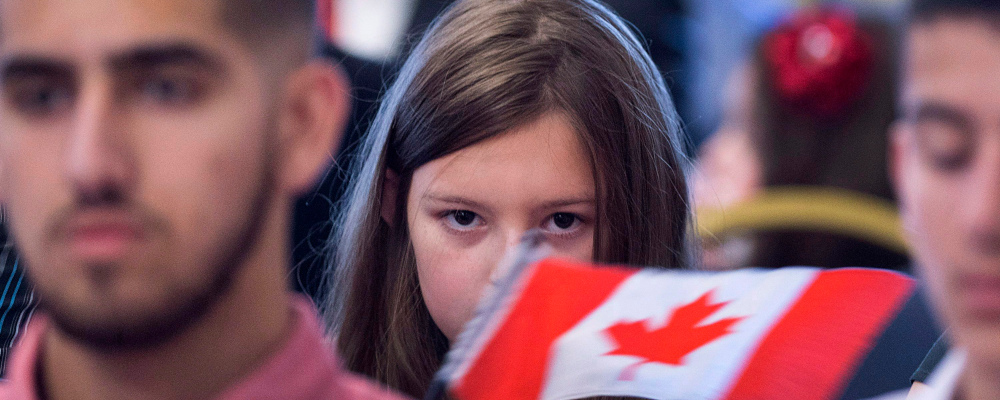Canada is among the most open societies on earth. In recent years we’ve been a beacon of calm amidst a global populist storm. Canadians are proud of the open, tolerant society that we’ve inherited. We welcome people from around the world with open arms. But our capacity to absorb people is increasingly constrained by our housing markets. If Canada wants to keep being the kind of country we think it is, we need housing abundance.
This really hit me as I arrived in my old hometown of Winnipeg for an extended visit. One of the first things you see when you’re leaving the airport is a sign welcoming Ukrainian refugees. Manitoba is one of the most Ukrainian places outside of Ukraine, so it’s not surprising that the province has welcomed more Ukrainian refugees than any other province on a per capita basis.
You don’t have to walk around downtown Winnipeg very long to find Ukrainians. I’ve heard people speaking Ukrainian regularly since I arrived. I’ve had a few conversations with newcomers here and there, mostly about the weather (it’s been unusually cold even by Winnipeg standards). I’d love to hear their stories, but I’m sure most would rather avoid weightier topics. They all seem grateful to be here, despite the circumstances. It’s been an incredibly moving experience. A very Canadian experience.
The experience is often quite different in Canada’s biggest cities, where we struggle to accommodate many newcomers—refugees in particular. Canadians have long welcomed high levels of immigration. But the housing markets in the Greater Toronto Area and Lower Mainland haven’t kept up with demand. Canada has both some of the highest immigration levels and the lowest number of housing units per capita in the G-7. That combination is not sustainable. No one should be surprised to hear that many Ukrainian refugees are struggling to find housing in the GTA.
To be fair, Winnipeg isn’t doing anything special when it comes to housing. Housing demand here is nowhere near as strong as it is in Toronto or Vancouver. But it highlights the fact that having a more balanced housing market makes it easier to absorb newcomers.
There is a lot of housing being built in the GTA and Lower Mainland. It just isn’t enough to keep up with demand. This isn’t a failure of the market: it’s a failure of government.
The core issue facing the GTA and Lower Mainland is that governments restrict both density and sprawl. The combination of anti-sprawl policies and onerous zoning means that it’s hard to build both upward and outwards.
It’s hard to see the problem from ground level. When you’re wandering around Downtown Toronto (or even Vancouver) it looks like there is development everywhere. You have to zoom out to an aerial view to really see the problem: much of the development is restricted to a few pockets zoned for density.
Roughly two-thirds of residential land in Toronto was zoned only for single-detached houses (it’s a similar story in Vancouver). So we need to cram the majority of new housing into a small percentage of the land mass. Most of the growth in the region over the past half-century has been oceans of detached houses surrounding a few pockets of very high density. We even have a name for it: tall and sprawl.
There are two immediate consequences to this development pattern. First, we haven’t been able to build nearly as many housing units as we would be able to if we had more market-driven housing policies. Second, we’ve been restricted to building the highest-cost types of housing: condo towers and detached homes. We essentially stopped building the kind of working-class housing that we have in now trendy neighbourhoods in the West and East ends of Toronto. Townhouses and walk-up apartments are the exceptions rather than the rule in most of the GTA and Lower Mainland.

Of course, there has been some notable progress made on housing policy in Toronto and (to a lesser extent) Vancouver over the past few years. There is still much to be done on the policy front, though, and there is a lot more uncertainty with John Tory’s departure. There’s no guarantee we’ll get a remotely pro-housing mayor. It’s just as possible that we’ll take a step backward rather than building off of recent policy wins.
Getting housing policy right isn’t the end of the story. We also need to be able to physically build more housing. By some estimates, we need to double housing starts in Ontario, for instance. That would take a herculean effort. We need the labour, training, materials, and investment dollars to make it happen. That doesn’t happen overnight. And the longer it takes to get the policy framework right, the longer it will take for businesses and potential workers to adapt. The longer that takes, the worse things will get.
If Canada’s housing situation continues to deteriorate, it will test our ability to integrate newcomers. That might undermine our pro-immigration political consensus. It’s much easier to be accommodating when you can afford a decent place to live.
Canada can continue to be a beacon of hope for the world’s dispossessed if we’re willing to accommodate them. But we’re not being fair to anyone if we welcome them into the country and they have nowhere to live. It’s hardly compassionate to say: Welcome to Canada—sorry, we have no vacancy.
Recommended for You

Stephen Harper and the power of principled leadership

Rising separatism in Alberta and Quebec could put 2 million Canadian jobs at risk

How the West lost control of immigration, crime, and antisemitism

‘There is a sense of disorder’: How dramatic shifts in immigration, crime, and antisemitism are changing the West



